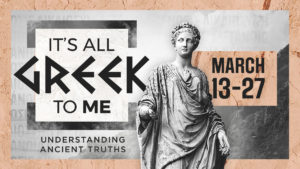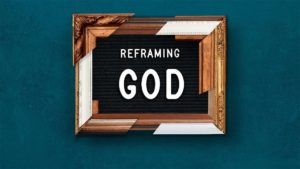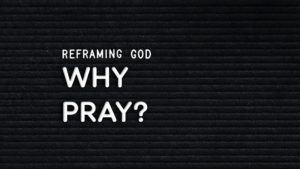That was Jen Clay and Kelli Bosse, two women who serve at Gateway Central and North respectively. I know we have been promoting our supplemental podcast, but you truly do need to hear from these two women and what they have to say about purpose in the workplace and in life. We are so blessed as a church to have incredible leaders who embody living a life of purpose.
Talking about one’s purpose is not a difficult thing to do for a pastor. We exist and are called to do just that, to help draw out the purpose of God in the people we are called to lead. The easy part is pointing you to what God says, the hard part is finding the right starting point to even begin to speak about purpose. For fun I googled the phrase, “What is my purpose?” and there were 7.7 billion results. Scanning through those results were self-help gurus, spiritual leaders, moms with blogs, and of course, the never aging, Tony Robbins. But it is important that we are all listening and processing from a similar vantage point today.
A Definition of Purpose
So let’s do two things to get us all on the same page as we tackle the issue of flourishing in our purpose.
- Let’s get a working definition of purpose both secularly and spiritually.
Purpose – “the reason for which something is done or created or for which something exists.”
- What kind of purposeful life are we discussing? There are two major umbrellas of purpose philosophy: one is existentialism and the other is essentialism. Existentialism demands we find a purpose out of an otherwise meaningless life, and essentialism challenges us to find the purpose that already exists for us.
For clarity’s sake we’re going to have a working assumption that “purpose is the endeavor of fulfilling the desire that God intended for each of us by placing breath in our lungs, and forming us in our mother’s womb.”
What we know about God’s purpose is that we were created in his image (Genesis 1:27) and by embracing that fact we then are called to be a reflection of him in the earth.
“Arise, shine, for your light has come, and the glory of the Lord rises upon you. See, darkness covers the earth and thick darkness is over the peoples, but the Lord rises upon you and his glory appears over you. – Isaiah 60:1-2
We’re also going to assume that without God there is no purpose beyond what we see and hear on the earth.
The Example of Daniel
One of my favorite things to do is to not only point us to scripture, but to interpret scripture as a story to better understand the heart of God towards us. So when searching scripture for a story of purpose and reflecting God’s intentions, I figured we should make a pit stop in the book of Daniel.
3 Then the king ordered Ashpenaz, chief of his court officials, to bring into the king’s service some of the Israelites from the royal family and the nobility— 4 young men without any physical defect, handsome, showing aptitude for every kind of learning, well informed, quick to understand, and qualified to serve in the king’s palace. He was to teach them the language and literature of the Babylonians. 5 The king assigned them a daily amount of food and wine from the king’s table. They were to be trained for three years, and after that they were to enter the king’s service.
6 Among those who were chosen were some from Judah: Daniel, Hananiah, Mishael and Azariah. 7 The chief official gave them new names: to Daniel, the name Belteshazzar; to Hananiah, Shadrach; to Mishael, Meshach; and to Azariah, Abednego. – Daniel 1:3-7
Can you imagine what this experience must have been like for these young men? They went from royalty to enslaved. More than likely, they were castrated. They had been forcibly removed from their homes and now living in a strange land, with a strange language, and given new names.
Their “new” names whose meanings centered on several the Babylonian gods: Beltashazzar – Bel will protect;
Shadrach – inspired of Aku;
Meshach – belonging to Aku;
Abednego – servant of Nego.
Assigning new names was a common court practice in the ancient world. Its blatant intention was to change the entire identity of the bearer until the life matched the title.
In spite of this, notice what happened.
8 But Daniel resolved not to defile himself with the royal food and wine, and he asked the chief official for permission not to defile himself this way. 9 Now God had caused the official to show favor and compassion to Daniel, 10 but the official told Daniel, “I am afraid of my lord the king, who has assigned your food and drink. Why should he see you looking worse than the other young men your age? The king would then have my head because of you.”
11 Daniel then said to the guard whom the chief official had appointed over Daniel, Hananiah, Mishael and Azariah, 12 “Please test your servants for ten days: Give us nothing but vegetables to eat and water to drink. 13 Then compare our appearance with that of the young men who eat the royal food, and treat your servants in accordance with what you see.” 14 So he agreed to this and tested them for ten days. – Daniel 1:8-14
Daniel introduced them to The Daniel Plan! This is not a pro-vegetarian and anti-meat message.
I love meat. In fact I subscribe to my former pastor’s view on ethical eating.
I do not believe it is ethical to eat anything that cannot run for its life.
So why wouldn’t Daniel eat the king’s food?
- Some of the food may have been forbidden according to Leviticus 11 or 17:10-14. Pig and horse was commonly eaten in Babylon (Baldwin, Daniel, 83), both would violate Jewish food taboos.
- Or it could be the refusal is because Jewish law forbids the eating of meat that is sacrificed to false gods.
- Or maybe Daniel understands eating the king’s food as representing accepting the king’s friendship and patronage. To share food is to commit oneself to a relationship. Daniel does not refuse the training of the king or the use of a new name, but he draws the line at the eating the king’s food because it is a public declaration of dependency on the king. Daniel did not rely on Nebuchadnezzar, but only on the Lord.
Daniel resolves himself not to eat this food.
This is literally “sets his heart” not to eat the food.
Daniel understands the situation, and decides, in his heart, what is right and what is wrong, and choose to do the right thing. Once set, Daniel will not be moved.
So he took a risk. He could have been killed, but they were given the chance.
15 At the end of the ten days they looked healthier and better nourished than any of the young men who ate the royal food. 16 So the guard took away their choice food and the wine they were to drink and gave them vegetables instead. 17 To these four young men God gave knowledge and understanding of all kinds of literature and learning. And Daniel could understand visions and dreams of all kinds.
18 At the end of the time set by the king to bring them into his service, the chief official presented them to Nebuchadnezzar. 19 The king talked with them, and he found none equal to Daniel, Hananiah, Mishael and Azariah; so they entered the king’s service. 20 In every matter of wisdom and understanding about which the king questioned them, he found them ten times better than all the magicians and enchanters in his whole kingdom. – Daniel 3:15-20
What I love about this story is that the 4 Hebrew young men truly embodied what we’re talking about today.
They knew that their purpose was to live out the imago dei wherever they were.
They used to be in the royal court with nobility and honor, and now they are captives in a foreign land. Yet, that doesn’t change their purpose of being what God wants them to be. They were offered choice food and drink, they could have played by the new rules in the new land, but their circumstances were not going to redefine their purpose of being an image of God.
When I flash this picture what are a few things that pop into your head? Shows, gambling, the desert…and of course “what happens in Vegas stays in Vegas.” What is it about going somewhere we can just let go and not live according to our god-given design? How has a city built an entire industry on you and I escaping from our design to live an unmentionable life that we know is NOT what we were designed for?
The answer is because most people are not truly living on purpose, we are wandering aimlessly until Vegas gives us 3 days to do whatever we want, pay the money to do it, and feel so good about it that we can’t talk about it when we return home. The reason why it’s a secret is because it doesn’t line up with who we were created to be in God’s image.
Daniel and his friends have every excuse to eat and live differently, but their response is, 12 “Please test your servants for ten days: Give us nothing but vegetables to eat and water to drink. 13 Then compare our appearance with that of the young men who eat the royal food, and treat your servants in accordance with what you see.”
When God saw their faithfulness to not only Him, but to their original design (imago dei) he gave them an ability beyond what they could have asked for:
17 To these four young men God gave knowledge and understanding of all kinds of literature and learning. And Daniel could understand visions and dreams of all kinds. – Daniel 1:17
Daniel’s obedience was not to get something from God, but when we are lined up to our purpose in God it garner’s His attention. Then it activates the next part, when we live according to God’s purpose for our lives, we then can be a reflection of who God is in the earth.
18 At the end of the time set by the king to bring them into his service, the chief official presented them to Nebuchadnezzar. 19 The king talked with them, and he found none equal to Daniel, Hananiah, Mishael and Azariah; so they entered the king’s service. 20 In every matter of wisdom and understanding about which the king questioned them, he found them ten times better than all the magicians and enchanters in his whole kingdom. – Daniel 1:18-20
Mind you, these were not the perfect circumstances for these young men. They were prisoners of war in a far off land called Babylon, and they faced the fiery furnace, lions, liars and cheats. They could have succumbed to the lies of their surroundings, but they stayed steadfast.
Here’s the funny and frustrating thing about living out our calling in light of our purpose, it changes. Our purpose is steadfast, but the way we are challenged to live it out is fluid.
Yes, being carried off to Babylon as young men changed the trajectory of their lives. The truth is, in Jerusalem they were young and defined by their nobility, but in Babylon they were wise and defined by their God. Because as we said at the very beginning:
Your purpose is not WHAT you do. It’s what happens WHEN you trust your life into God’s hands.
God Brings Good Out of the Bad
In Jerusalem they were being bred to be without physical defect, handsome and qualified
But in Babylon they were being bred to lead a nation filled with God’s righteousness
In Jerusalem they would have had the best learning and would have been well informed
But in Babylon they had an impartation of God’s supernatural ability to see visions and interpret dreams
In Jerusalem they would have smelled like money and riches
But in Babylon they were thrown into fires but came out smelling like they had been with the son of God
In Jerusalem their future was still being written
But in Babylon they were writing a story that we are still proclaiming 2500 years later
What is true of God and us THEN, is true of God and us TODAY.
The image of God on you does not change, the purpose of reflecting God wherever you go does not change, but the way we live out that purpose does.
Our lives are intricate, interesting, messy and vibrant all at the same time.
Because life can be hard!
Have you allowed God to reveal Himself to you?
I believe God will reveal Himself to you as you seek Him.
He wants to make something beautiful out of your life – like an artist working on her masterpiece.
In fact we got to see this in real time this past week.
We gave 6 artists of different ages, ethnicities, and backgrounds blank canvases. We didn’t give them any direction, we simply played some music and said, “Paint what you feel”. It was beautiful to capture the process of Something from Nothing.
I’m holding this beautiful creation from one of the artists you saw in the video. And maybe you didn’t realize this but not only did she have a hand in this art, but so did some of our staff. Aaron Ojeda and Kelsie Rogers created the score and refrain that you heard our band perform. And Kendal Rogers then masterfully put it all together in video.
But the truth is when the idea was kicked around, none of us truly knew how it would all turnout. These artists could’ve put 2 dots and 3 emojis on their canvas and that’s what we would’ve ended up with. But we trusted the work of art in their hands. And we don’t know what they were thinking, feeling, envisioning with every brushstroke. But I do know that every color, texture, medium, and moment to rest was full of PURPOSE.
What’s true of this art piece that I’m holding is true of your life. God’s Word puts it this way For we are God’s handiwork, created in Christ Jesus to do good works, which God prepared in advance for us to do. – Ephesians 2:10
Did you hear that you are God’s handiwork?
In other translations it says MASTERPIECE!
That means your life is a work of art. It does not matter what others have said about you, it doesn’t even matter what false things you believe about YOU. The master artist of the universe calls you a MASTERPIECE.
And you might think:
“But Carlos, you don’t know my story. I’m a mess, I have NOTHING to offer.”
Can I tell you he makes beauty out of NOTHING.
Everything in creation was once nothing but a blank canvas until the author of the Cosmos spoke into existence.
I would venture to say God makes his best THINGS out of what we call NOTHING.
Charles Spurgeon once said, “When you cannot trace God’s hand, trust His heart.”
Because the truth is we don’t always understand every brushstroke of change, every color wave of emotion, or the different textures of careers or relationships or loss.
But when you trust your life into the hands and heart of the master artist that is God the Father, you can rest assured He’s making a Masterpiece- as the lyrics in the song said “something out of nothing”.
THAT is purpose. It’s not WHAT you do. It’s what happens WHEN you trust your life into God’s hands.
The Message of True Faith
The true message of faith is a beautiful and redemptive message.
American churchianity has gotten in the way and confused things. The message of Jesus is not about aligning to a political party. It’s not judgmental or hypocritical.
It’s about how out of tragedy can come joy.
The message of faith is that God created us and loves us and gives us freedom.
In that freedom we make decisions which either bring more light into the world or more darkness into the world.
God has intervened. He came to rescue us from the darkness, and His name is Jesus.
Jesus taught us how to live
Jesus demonstrated how to love others – including the overlooked and the outcast.
Ultimately Jesus rescued us by dying on the cross – taking upon Himself the darkness and sin and evil of our world and that has infiltrated our hearts.
But death could not hold Him down as He rose from the dead on the 3rd day.
And Jesus is Alive and invites us into a relationship with God.
God invites each of us to bring the tragedies of our lives and let Him bring something beautiful when we surrender our lives to Him.




